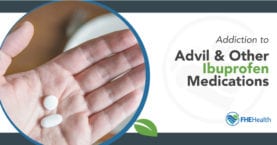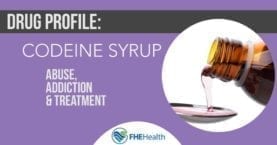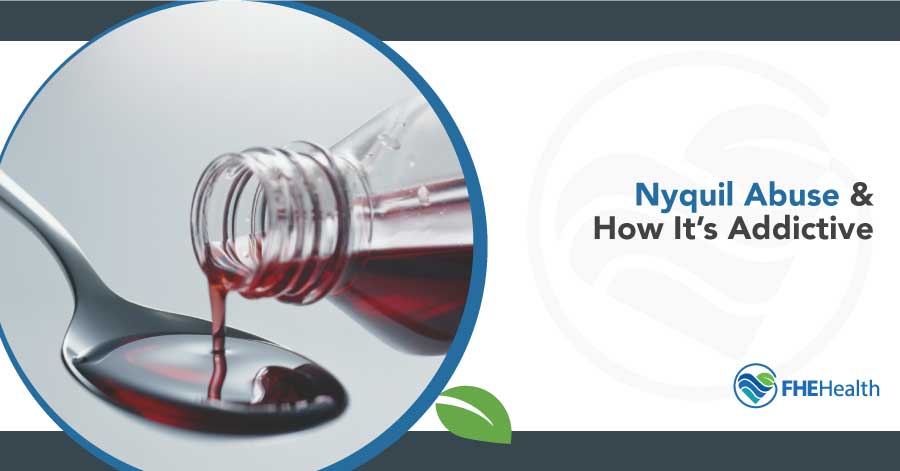
What Is NyQuil?
NyQuil is a popular cold and flu medication containing ingredients to reduce fever, joint aches, congestion and coughing associated with upper respiratory illnesses and allergies. Available as a liquid or gel capsule, NyQuil offers consumers the choice between “daytime” and “nighttime” NyQuil. Daytime NyQuil does not cause drowsiness. Nighttime NyQuil contains an antihistamine called “doxylamine.” Doxylamine decreases histamine chemicals in the body that cause congestion, sneezing and itchy eyes.
NyQuil also contains “dextromethorpan” (DXM), which temporarily relieves coughing by suppressing activity in the brain’s medulla oblongata area. Reflex centers in the medulla oblongata control activities such as swallowing, sneezing, vomiting and coughing.
Dextromethorphan abuse causes symptoms similar to stimulant use, such as hyperactivity, distorted perceptions, increased heart beat, sweating and hallucinations. Originally developed by the CIA and U.S. Navy to help wean people off a codeine addiction, DXM was approved 50 years ago by the FDA for use in over-the-counter, cough suppressant medications.
DXM can be bought on the street as powder capsules. Street names for DXM include “red devil,” “skittles” and “Robo” (a reference to Robitussin, another cough suppressant containing DXM). “Robo-tripping” is a slang term for getting high on Robitussin or other DXM-containing, cough medicines.
Is NyQuil Addictive?
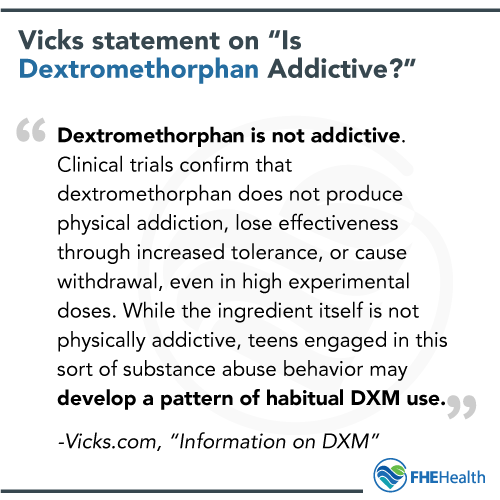 Although doxylamine and dextromethorphan are not nearly as addictive as opioids and powerful stimulants, doxylamine abuse can make it difficult for people to get to sleep. Building up a tolerance to NyQuil means a user will need to take more and more NyQuil to achieve desired drowsiness or the stimulatory effects caused by dextromethorphan.
Although doxylamine and dextromethorphan are not nearly as addictive as opioids and powerful stimulants, doxylamine abuse can make it difficult for people to get to sleep. Building up a tolerance to NyQuil means a user will need to take more and more NyQuil to achieve desired drowsiness or the stimulatory effects caused by dextromethorphan.
Doxylamine works by targeting histamine receptors in the brain to induce sedative properties. In addition to being found in NyQuil, doxylamine is also used in many over-the-counter (OTC) sleep aids. Both OTC sleeping pills and NyQuil come with warnings not to use these medications for longer than 10 days.
Dextromethorphan is mostly misused by teenagers or hard-core stimulant addicts who cannot quickly access their drug of choice. Overdosing on DXM is more dangerous to a person’s health than overdosing on doxylamine. DXM has the ability to initially stimulate a person physically and mentally but then cause extreme sedation when misused or combined with alcohol. Addiction to DXM is also more prevalent among teenagers than addiction to doxylamine.
Does NyQuil Contain Alcohol?
NyQuil Liquid is the only NyQuil product containing alcohol (10 percent). NyQuil gel capsules do not contain alcohol. The risk of alcohol intoxication from the liquid is extremely low, however. If someone were to try to drink enough NyQuil to get intoxicated, they would overdose from the other compounds much quicker and probably die without emergency treatment before they began to feel the effects of being drunk.
How Safe Is NyQuil?
When taken according to instructions and not combined with alcohol or other medications, NyQuil is safe for use in adults and children over 12 years old. However, abusing NyQuil by taking more than the recommended dosage may cause the following side effects:
- Anxiety
- Dizziness
- Confusion
- Vomiting/diarrhea
- Difficulty with memory
- Blurry vision
- Rapid heartbeat/rapid breathing
- Panic attacks
Signs of possible NyQuil overdose include:
- Skin rash/hives
- Jaundice
- Vision distortions
- Hallucinations
- Seizures
Overdosing on NyQuil demands emergency treatment— but not because of doxylamine. Instead, the primary danger to overdosing on NyQuil is DXM and the pain reliever acetaminophen found in NyQuil. Unless counteracted by activated charcoal or a gastric lavage (stomach pump), an acetaminophen overdose can cause severe liver and kidney damage.
Statistics on NyQuil Abuse in the U.S.
A 2019 national survey by the National Institute on Drug Abuse (NIDA) and University of Michigan survey found just under three percent of U.S. adolescents used products containing DXM to get high. The U.S. FDA states that thousands of emergency room visits are made every year by people who have overdosed on NyQuil. In many cases, overdose emergencies involving NyQuil occur when people combine NyQuil with alcohol or other medications.
There is limited information regarding the prevalence of NyQuil as a “gateway” drug. Anecdotal reports from emergency rooms and rehabilitation centers do suggest that some people with an illicit drug problem can trace their addiction back to the misuse of Nyquil during their adolescent years.
Are NyQuil Withdrawal Symptoms a Real Thing?
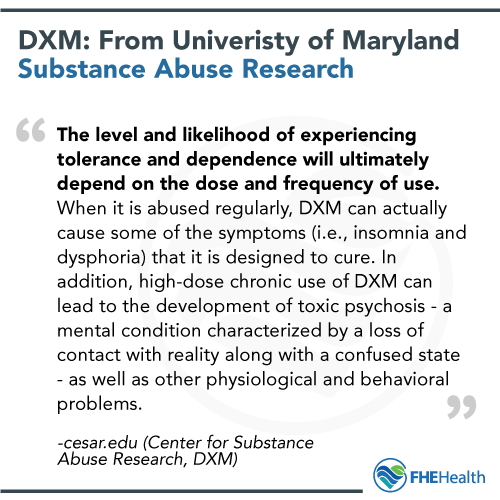 If someone exceeds the recommended dose of Nyquil, or combines it with alcohol on a daily basis for more than two to three weeks, they may experience withdrawal symptoms upon stopping. Signs of NyQuil withdrawal include:
If someone exceeds the recommended dose of Nyquil, or combines it with alcohol on a daily basis for more than two to three weeks, they may experience withdrawal symptoms upon stopping. Signs of NyQuil withdrawal include:
- Restlessness, anxiety and agitation
- Insomnia
- Abdominal pain
- Nausea, vomiting and diarrhea
- Depression or “gray” mood (rarely do people withdrawing from NyQuil experience suicidal ideation)
- Cravings for NyQuil or other medications containing similar ingredients
Withdrawal symptoms are usually not life-threatening and can often be resolved without professional treatment. However, if a person has been combining NyQuil with alcohol or marijuana over a long period of time, their withdrawal symptoms may be more intense and require medical detoxification and treatment at a rehab center.
What Are the Dangers of Mixing NyQuil and Alcohol?
Alcohol increases the effects of DXM and doxylamine and may raise the risks of complications or overdose. Both alcohol and doxylamine are central nervous system depressants which can suppress the respiratory system, interfering with normal breathing. Alcohol interacts with acetaminophen to worsen the damaging effects this pain reliever has on the liver and kidneys.
When combined with alcohol, DXM may cause a person to hallucinate or have paranoid thoughts. The effect of alcohol interacting with DXM can even produce the powerful kind of psychoactive “high” experienced by people taking LSD or ketamine.
How Does Vicks® Address the Issue of Teen Abuse and Addiction to NyQuil?
According to its website, Vicks® is aware of the abuse risk posed to teens by NyQuil. They provide advice for parents who suspect their teen may have a NyQuil problem and reiterate the importance of talking to teens about how dangerous NyQuil ingredients can be when misused.
Vicks® recommends monitoring how much NyQuil is used when it is in the home for the purpose of relieving symptoms of colds and flu. Parents should not allow teenagers to keep NyQuil in their bedrooms or carry NyQuil in their backpacks to school. Vicks® further advises parents to avoid having more than one bottle or package of NyQuil in their home at any given time.
When Does a Nyquil Addiction Require Professional Treatment at a Recovery Center?
It may be difficult for long-term NyQuil users to quit without addiction treatment. Severe withdrawal symptoms can trigger a quick return to NyQuil or other drugs in an effort to relieve the symptoms. FHE offers supervised medical detoxification for all drugs accompanies by psychotherapeutic treatment programs for addiction. Call FHE today for immediate help.
